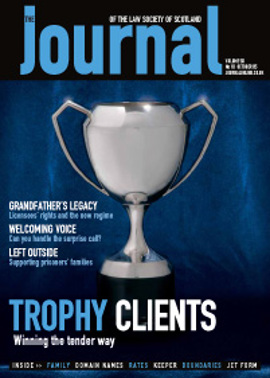Tales from the court

Marriage by deception
Only one thing spoilt the happiness of Karen Wetherhill when she met and fell in love with Zahid Sheikh: the inconvenient fact that he was already married to someone else. But that was an arranged marriage to which Zahid was not committed, and so Karen and Zahid moved in together, started a business together, and had two children together. Zahid’s parents, with whom his (proper) wife lived, would accept Karen as a member of the family only if she were married to Zahid, so they told his parents (and presumably the wife) that they were indeed married. The (proper) wife left Scotland and soon thereafter divorced Zahid. Karen was now free to marry the father of her children, but she refused to do so because she did not wish to change religion and believed that she would be trapped and would have to cover her head in public. Zahid’s family continued to believe they were already married in any case.
Sadly, the relationship broke down and Karen and Zahid separated. Karen now sought financial provision on divorce from him but, of course, needed to establish that she was married in the first place. Enter the doctrine marriage by cohabitation with habit and repute. There was clear cohabitation for some 12 years after the (proper) wife had divorced Zahid and, Lord Philip held, sufficient habit and repute.
Karen may well have believed herself “married” in a social sense but she knew full well that she was not married in any lawful sense. The repute was the result of deliberate deceit to pull the wool over the eyes of a devout family – and Karen participated in that deceit as much as the unscrupulous, tax-evading, bad debtor perjurer, Zahid. As a cohabitant she probably deserved some financial provision, and the Family Law (Scotland) Bill currently before the Scottish Parliament will allow people in her position certain claims. But to regard her as “married” illustrates all that is wrong with the bankrupt concept of marriage by cohabitation with habit and repute.
Two issues in forced marriages
June Kaur was 18 years old, with a boyfriend called Keith Singh, when her mother took her to India and married her off, against her will, to a man she did not know. June was taken to her new husband’s house but she refused to have sex with him and a week later she returned to Scotland. She moved out of her parents’ house and went to live with Keith, with whom one hopes she will be very happy.
Temporary Judge Macdonald found that June’s mother had threatened to destroy her passport, leaving her stranded in India, if she did not submit. He held that this threat of immediate danger to June’s liberty, causing her will to be overborne, vitiated her consent. But he also sounded a cautionary note. The threats had to be of immediate danger to life, limb or liberty. He doubted whether the threats in the earlier case of Mahmud v Mahmud 1994 SLT 599 (that shame and degradation would be visited upon the whole family unless the pursuer submitted to the marriage arranged by his parents) satisfied this test. Lord Prosser in that case had, of course, granted the declarator of nullity but Judge Macdonald would not have done so.
There was another interesting feature in this case: choice of law. Is it the lex loci celebrationis (in this case India) or the law of the domicile (in this case Scotland) that determines whether a marriage is invalid due to duress? An obiter dictum in Di Rollo v Di Rollo 1959 SC 75 had suggested that the question of whether true consent had been given was a matter for the lex loci celebrationis, though an English case had come to the opposite conclusion. Judge Macdonald preferred to follow the English case. Again, the Scottish Parliament will shortly resolve the issue, for there are provisions in the Family Law (Scotland) Bill ensuring that matters of capacity and validity of consent to marriage are all to be determined by the law of the domicile, with the added safeguard that Scots law will apply in these matters for all marriages conducted in Scotland.
Insisting on the court
Mr and Mrs B were living in Aberdeen when a baby girl was born to them. When the child was three, Mrs B removed herself and the child from the family home and went to live in London. A residence and contact dispute was played out in the English courts, the end result of which was that Mrs B retained residence and Mr B was entitled to contact.
Mr B then raised an action in the sheriff court at Aberdeen, seeking divorce from Mrs B and also a residence order over the child (failing which a contact order) in terms of the Children (Scotland) Act 1995. The sheriff found that he lacked jurisdiction in the matter of residence, but the sheriff principal allowed an appeal on that question. When the case came back to the sheriff, he sisted the cause, so that the matter could be determined in England, this on the basis that the English family court was already seized of the matter. Back went Mr B to the sheriff principal, but this time that judge agreed with the sheriff. Mr B then sought to have the sist recalled but the sheriff refused on the basis that there had been no change of circumstances. Yet again Mr B went back to the sheriff principal, who again agreed with the sheriff and this time Mr B appealed further to the Court of Session. By this stage the matter had little to do with the wee girl, and all to do with jurisdiction.
The Inner House had little difficulty in holding that, since an appellate court can interfere with a discretionary decision of a judge at first instance only if the latter had misdirected himself in law, misapprehended the material facts, taken account of irrelevant facts, or reached a decision that was wholly unreasonable or plainly wrong, the appeal had to be dismissed. But they also agreed that, under section 41 of the Family Law Act 1986, the English courts had been seized of the matter before the Scottish courts and so the English courts had retained jurisdiction to the exclusion of the Scottish courts ever since. The court ended with some finger-wagging: the appellant’s obduracy in insisting that his child’s future be determined in Aberdeen showed that he had little concern for the child’s real welfare and was more concerned about his own sense of injustice to himself. This is not, sadly, an unusual phenomenon in family cases.
An ongoing financial saga
The saga of the divorce between Mr and Mrs Patrick Sweeney continues to entertain and inform. It will be recalled that in 2002 a divorce was granted to Mrs Sweeney with an order for financial provision against Mr Sweeney in the order of some three quarters of a million pounds. Mrs Sweeney, who like Oliver Twist wanted more, reclaimed on the ground that the Lord Ordinary had wrongly deducted amounts payable as capital gains tax in valuing the matrimonial property to which she was entitled. That appeal was successful (2004 SC 372) and at that stage Mr Sweeney lodged supplementary grounds for a cross appeal, arguing that special circumstances existed which justified a departure from equal sharing, and that the making of an order for a capital sum was unreasonable in light of his existing resources.
The “special circumstances” that he put forward were primarily that his assets, being business interests, could not be realised without damaging their value: his wealth, he argued, was “theoretical” rather than “practical”. Mrs Sweeney argued, however, that since the date of the original decree (in suspension due to the appeal) her ex-husband had been transferring his remaining assets from his free holding into his business: the implication was that he had deliberately made his assets difficult to realise and so had deliberately created his own special circumstances. The Inner House did not find that he had acted unreasonably and so they found that it would be unreasonable having regard to his resources to order that all his remaining non-business assets be made over to his ex-wife.
The court decided to modify (to a fairly modest extent) the amount Mr Sweeney had to pay, and they ordered that the amount be payable in instalments: Mr Sweeney saved, and Mrs Sweeney lost, around £100,000 in this latest round of this complex litigation.
Domestic power-games
Men (and mothers) behaving badly indeed. Families remain a fertile source of domestic power-games which the courts must strive hard to bring to an end.
Kenneth McK Norrie, University of Strathclyde
In this issue
- Back on the home front
- Exchanging the "missive"
- Perfect pitch
- Tales from the court
- The going rate
- Licence please
- "Your call is important to us..."
- Wake up to .eu
- Know your boundaries
- Outside in
- Checks and balances
- Policy and practice
- Supporting credentials
- Infrastructure: who pays?
- Protective awards unprotected
- Website reviews
- Book reviews
- New terms for old
- Keeper's corner






